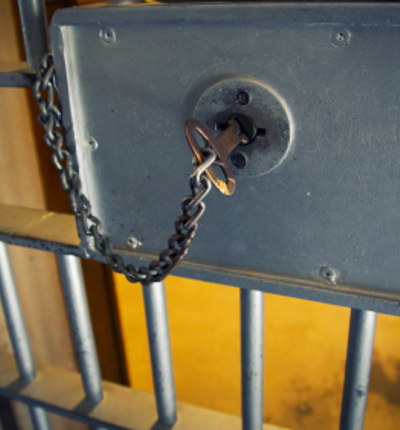
The unknown impact of COVID-19 on the health of prisoners
Benjamin Burrows and Maya Grantham discuss the impact of the COVID-19 pandemic on the health of the ageing prison population of England and Wales.
Posted on 05 November 2020
As we adapt to further COVID-19 restrictions in the community, prisoners across England and Wales have remained under heavily restricted prison regimes since March 2020, with little let up in the restrictions since then.
This has meant prisoners being locked in their cells for 23 hours a day, having limited or no visits from family or friends, and having fewer work and education opportunities. As well as jeopardising their mental health, there are growing fears that COVID-19 and the regime restrictions could also be having an untold impact on prisoners’ physical health and wellbeing.
Prisoners in England and Wales are an ageing population and are more likely than members of the general population to suffer from an underlying health condition. A recent Justice Committee report on the ageing prison population identified that the “older prisoner cohort, many of whom have underlying health conditions and whose health is generally poorer than for other inmates and people of the same age in the community, may be particularly vulnerable to Covid-19”.
However, despite this, healthcare provision in prisons has repeatedly found to be of a much lower standard than that received in the community.
In February, we considered the continuing decline of healthcare provision in prisons following a report by the charity INQUEST. Although the report’s findings pre-date COVID-19 and the regime restrictions, they paint a picture of a prison healthcare system that was already straining to meet the needs of its patients. Amongst its findings, the report concluded that healthcare provision in prisons was not equivalent to healthcare provision in the community and that there was a “lack of provision for people with complex needs along with insufficient health screenings and incomplete care plans”.
Therefore, at the outset, the prison healthcare system was much less likely to successfully withstand the problems caused by COVID-19 and the regime restrictions.
COVID-19 and the regime restrictions have made it even harder for prisoners to book or attend medical appointments. This problem appears to be particularly acute when it comes to hospital treatment. Prisoners are reliant on the prison to arrange escorts to and from the hospital. There is very little information about the numbers of appointments being booked or cancelled. However, anecdotal evidence suggests that very few prisoners are attending medical appointments at hospital due to the regime restrictions, whether for long-term conditions or potentially urgent ones.
Thankfully, although not known for certain, the number of COVID-19 cases and deaths in prison have so far been relatively low. However, taken together, the particular vulnerabilities of the prison population, combined with the pre-existing problems with the prison healthcare system and the new problems created by COVID-19 and the restricted regime, there is a clear cause for concern about what impact this is having upon the physical health and wellbeing of prisoners now, as well as what problems it may produce in the future.
The Independent Advisory Panel on Deaths in Custody recently reported concerns about a rise in numbers of natural causes deaths, based on the figures until June 2020. However, deaths by natural causes conflate all prisoner deaths caused by disease, including avoidable deaths contributed to by failings of healthcare.
The full extent of the impact of COVID-19 and the regime restrictions on healthcare provision in prisons cannot yet be known and may not be known for some time. Nonetheless, as things stand, in the event of a prisoner’s death, COVID-19 and the regime restrictions will not be considered a contributory factor unless the prisoner has in fact contracted the virus.
However, for the reasons set out above, the impact of COVID-19 and the regime restrictions goes beyond those prisoners who contract it. This impact should be thoroughly investigated as part of the circumstances of a prisoner’s death and, if it is found to have contributed, then it should be recorded as such and addressed urgently to prevent future deaths. The impact of COVID-19 and the restricted regime upon the prison healthcare system should have been foreseen, and any role that this has played in a prisoner’s death should not be ignored.
The Prison Team represent and advise prisoners and bereaved families in a wide range of healthcare and inquest matters.

